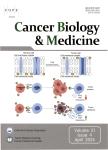Advances in MET tyrosine kinase inhibitors in gastric cancer
作者机构:Key Laboratory of Carcinogenesis and Translational Research(Ministry of Education)Department of Gastrointestinal OncologyPeking University Cancer Hospital&InstituteBeijing 100142China State Key Laboratory of Holistic Integrative Management of Gastrointestinal CancersBeijing Key Laboratory of Carcinogenesis and Translational ResearchDepartment of Gastrointestinal OncologyPeking University Cancer Hospital&InstituteBeijing 100142China
出 版 物:《Cancer Biology & Medicine》 (癌症生物学与医学(英文版))
年 卷 期:2024年第21卷第6期
页 面:484-498页
核心收录:
学科分类:1002[医学-临床医学] 100214[医学-肿瘤学] 10[医学]
基 金:supported by the National Natural Science Foundation of China(Grant No.81602057) the Beijing Natural Science Foundation(Grant No.Z210015)
主 题:Gastric cancer MET alterations MET tyrosine kinase inhibitors savolitinib MET testing
摘 要:Gastric cancer is among the most frequently occurring cancers and a leading cause of cancer-related deaths *** gastric cancer is highly heterogenous and comprised of different subtypes with distinct molecular and clinical characteristics,the management of gastric cancer calls for better-defined,biomarker-guided,molecular-based treatment *** is a receptor tyrosine kinase mediating important physiologic processes,such as embryogenesis,tissue regeneration,and wound ***,mounting evidence suggests that aberrant MET pathway activation contributes to tumour proliferation and metastasis in multiple cancer types,including gastric cancer,and is associated with poor patient *** such,MET-targeting therapies are being actively developed and promising progress has been demonstrated,especially with MET tyrosine kinase *** review aims to briefly introduce the role of MET alterations in gastric cancer and summarize in detail the current progress of MET tyrosine kinase inhibitors in this disease area with a focus on savolitinib,tepotinib,capmatinib,and *** on current knowledge,this review further discusses existing challenges in MET alterations testing,possible resistance mechanisms to MET inhibitors,and future directions of MET-targeting therapies.



